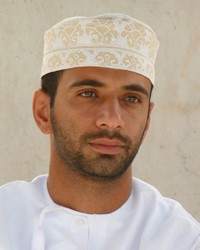Arab, Omani in Somalia

Photo Source:
CharlesFred - Flickr
Creative Commons
|
Send Joshua Project a map of this people group.
|
| People Name: | Arab, Omani |
| Country: | Somalia |
| 10/40 Window: | Yes |
| Population: | 111,000 |
| World Population: | 3,096,000 |
| Primary Language: | Arabic, Omani |
| Primary Religion: | Islam |
| Christian Adherents: | 0.50 % |
| Evangelicals: | 0.20 % |
| Scripture: | Translation Started |
| Ministry Resources: | No |
| Jesus Film: | No |
| Audio Recordings: | Yes |
| People Cluster: | Arab, Arabian |
| Affinity Bloc: | Arab World |
| Progress Level: |
|
Introduction / History
Omani Arabs represent a small percentage of Somalia's population. They are set apart from other Somalians by their use of the Arabic language and by their culture.
What Are Their Lives Like?
Omani Arabs in the south and northwest regions of Somalia usually live in rural farm villages. They grow bananas, citrus fruit, sugar cane, corn, cotton, and sorghum. A typical village consists of a cluster of homes made of stones or sun-dried mud. Some live in towns where they are employed as shopkeepers. The Omani often gather in the marketplaces to buy and sell goods and also to socialize. They love to tell stories, recite poems or verses from the Koran, and visit with their friends.
Many of the Omani are nomadic- or semi-nomadic herdsmen. They travel from place to place with their herds of camels, cattle, goats, and sheep. They live in small, collapsible huts made of arched wooden braces covered with skins and grass mats.
The Omani eat mainly dairy products, camel and goat meat, rice and other grains, and a variety of fruits and vegetables. Tea and coffee are their favorite beverages. Islamic law forbids them to eat pork or to drink alcohol. Most of the Omani wear traditional Arab clothes. Men wear white robes, turbans, and knives in brightly colored sashes. The women wear long, black dresses over colorful inner clothes. Some of them also wear black masks to cover their faces.
Omani Arabs live in extended family units. Their society is patriarchal, or male-dominated. The men do not abuse this authority because they believe that their families should obey them out of respect, rather than fear. There are clearly defined roles for both sexes. Even the children are given gender-specific duties. The men work outside in the fields while women work in the homes. Men and women often eat separately and never pray together. While men worship at mosques, women attend ceremonies conducted at home by female religious leaders. Marriages are generally pre-arranged by the parents. Children are a considered the family's greatest asset because they provide the parents with additional laborers and social security.
What Are Their Beliefs?
Omanis were among the first to embrace Islam. They are overwhelmingly Ibadi Muslims, a branch that is similar to Sunni Islam. The Ibadis favor the selection of their imams through consensus not heritage. In that way they differ from the dominant Sunni sector of Islam. Some would describe the Ibadi sector of Islam as moderately conservative. As far as we know there are almost no followers of Christ among the Omani Arabs and no fellowships of believers.
What Are Their Needs?
Omani Arabs need the chance to flourish economically so they don't have to migrate to other countries. They also need the chance to hear and respond to the claims of Jesus Christ so they can experience the abundant life He offers those who follow Him.
Prayer Points
Pray for open hearts and minds to the ways of Jesus Christ among the Gulf speaking Arabs in Oman.
Pray for the Lord to raise up persons of peace to welcome Christ's ambassadors to Omani families.
Pray for the Lord to send His appointed workers to take Christ to this highly unreached people group.
Pray that there will be an unstoppable movement to Christ among every people group in Somalia.